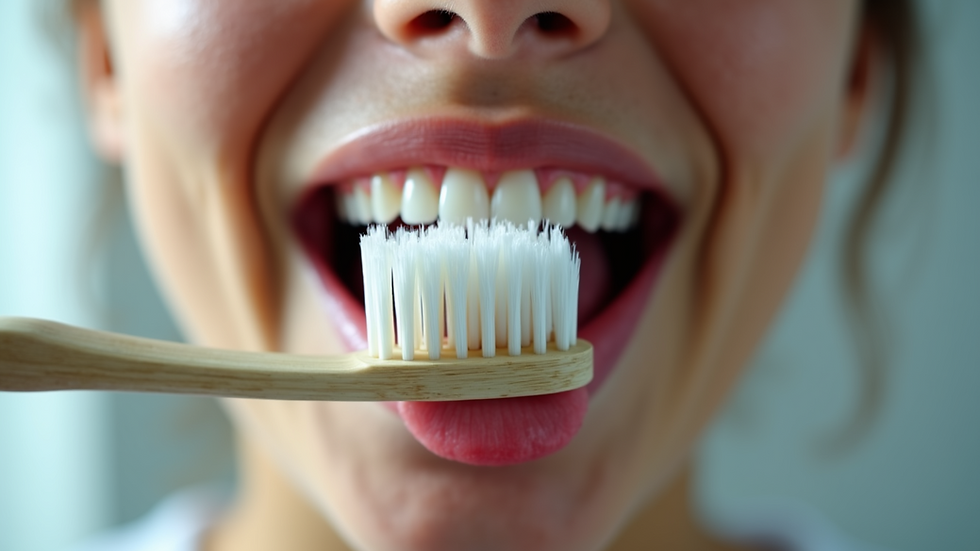The Importance of Consistent Mouth Care Practices
- Jane Peterson
- Jul 28, 2025
- 4 min read
Maintaining good oral hygiene is essential for overall health and well-being. Consistent mouth care practices help prevent dental problems such as cavities, gum disease, and bad breath. Beyond aesthetics, oral health is closely linked to systemic health issues, including heart disease and diabetes. This article explores why regular mouth care is vital, what it entails, and how to incorporate effective habits into daily life.
Why Consistent Mouth Care Matters
Oral health is more than just a bright smile. It plays a crucial role in your general health. When mouth care is neglected, bacteria can build up, leading to plaque formation and gum inflammation. Over time, this can cause tooth decay and periodontal disease, which may result in tooth loss.
Moreover, poor oral hygiene has been linked to other health complications. For example, bacteria from the mouth can enter the bloodstream, potentially causing infections or worsening conditions like diabetes and cardiovascular disease. Therefore, maintaining consistent mouth care is a preventive measure that supports both oral and overall health.
Regular mouth care also improves quality of life by reducing discomfort from dental issues and boosting confidence through fresh breath and a clean mouth. It is a simple yet powerful way to protect your health and well-being.

Effective Mouth Care Habits to Adopt
Developing a routine that includes effective mouth care habits is key to maintaining oral health. Here are some practical steps to follow:
Brush Twice Daily: Use a fluoride toothpaste and a soft-bristled toothbrush. Brush for at least two minutes, covering all surfaces of your teeth.
Floss Daily: Flossing removes food particles and plaque from between teeth where a toothbrush cannot reach.
Use Mouthwash: An antimicrobial mouthwash can help reduce bacteria and freshen breath.
Limit Sugary Foods and Drinks: Sugar feeds harmful bacteria that cause tooth decay.
Stay Hydrated: Drinking water helps wash away food particles and keeps saliva levels high, which protects teeth.
Visit the Dentist Regularly: Professional cleanings and check-ups help catch problems early.
Consistency is crucial. Skipping these steps occasionally can lead to plaque buildup and dental issues. Making these habits part of your daily routine ensures long-term oral health.

What is Basic Mouth Care?
Basic mouth care involves simple daily practices that keep your mouth clean and healthy. It includes brushing, flossing, and rinsing, but also extends to caring for the tongue and gums.
Brushing: Use gentle circular motions to clean teeth and gums without causing irritation.
Flossing: Slide the floss gently between teeth and curve it around each tooth to remove plaque.
Tongue Cleaning: Use a tongue scraper or toothbrush to remove bacteria that cause bad breath.
Gum Care: Massage gums gently to stimulate blood flow and keep them healthy.
Basic mouth care is easy to perform and requires minimal equipment. However, it is the foundation of good oral hygiene and should never be overlooked.
For those who require additional support, such as elderly individuals or people with disabilities, tailored mouth care routines can be developed to ensure effective cleaning.

How to Maintain Motivation for Mouth Care
Sticking to a mouth care routine can sometimes be challenging. Here are some tips to stay motivated:
Set Reminders: Use phone alarms or apps to remind you to brush and floss.
Make it Enjoyable: Choose toothpaste flavours you like and use a comfortable toothbrush.
Track Progress: Keep a journal or checklist to monitor your daily habits.
Understand the Benefits: Remind yourself of the health advantages and the feeling of a clean mouth.
Involve Family: Encourage family members to practice good mouth care together.
By making mouth care a positive and rewarding part of your day, you are more likely to maintain consistency.
The Role of Professional Support in Mouth Care
While daily habits are essential, professional dental care plays a vital role in maintaining oral health. Dentists and hygienists provide:
Thorough Cleanings: Removing tartar that cannot be eliminated by brushing alone.
Early Detection: Identifying cavities, gum disease, and other issues before they worsen.
Personalised Advice: Tailoring mouth care recommendations based on individual needs.
Treatment: Providing necessary interventions such as fillings, scaling, or orthodontics.
Regular dental visits complement your daily mouth care routine and ensure your oral health is monitored and maintained effectively.
For more detailed guidance and products related to mouth care, visit mouth-care.
Building Lifelong Mouth Care Habits
Developing consistent mouth care practices from an early age sets the foundation for a lifetime of good oral health. Parents and caregivers should encourage children to brush and floss regularly and make dental visits a positive experience.
Adults can also benefit from revisiting their routines and making improvements where necessary. Simple changes, such as upgrading to an electric toothbrush or using interdental brushes, can enhance cleaning effectiveness.
Remember, good mouth care is a continuous journey. Staying informed, motivated, and proactive will help you maintain a healthy mouth and a confident smile for years to come.




Comments